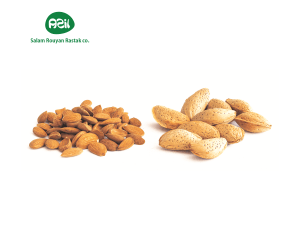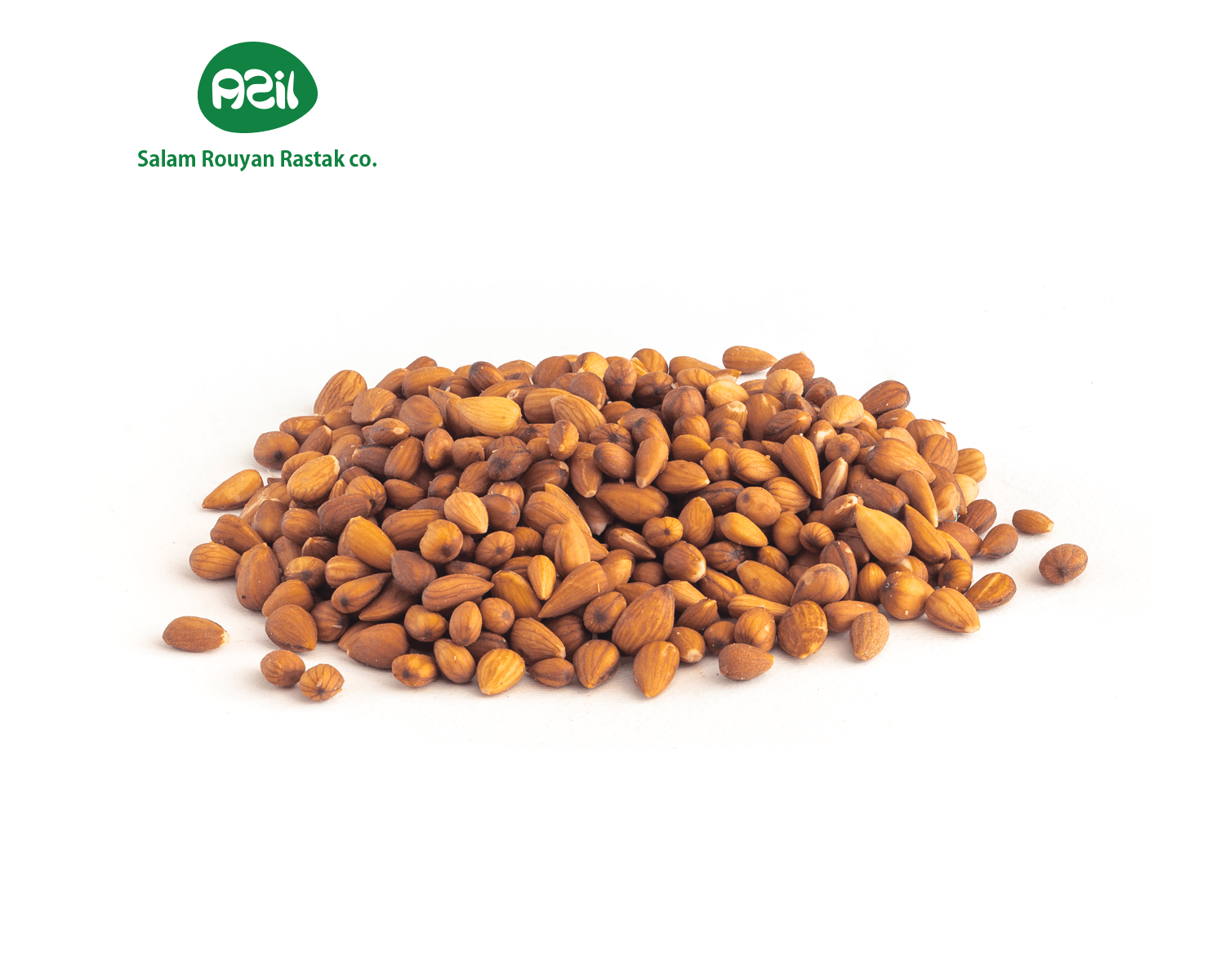Persian Almonds in Winter Evening Crafts
Persian almonds, with their crisp goodness, warm Iran’s winter evening craft workshops, sparking creativity. Known as “badam,” these nuts shine at 07:48 AM +04 on October 19, 2025. For example, artisans share them during cozy indoor sessions. This article explores how Persian almonds enhance winter evening craft workshop traditions, their cultural significance, and their health benefits. We’ll also dive into their cultivation, preparation, and global appeal. As exporters of saffron, nuts, and more, we share Iran’s finest badam too. So, discover why these almonds are a workshop treasure, how they’re used in Persian winter nights, and why they’re cherished worldwide. Join us to explore this nutty gem and see what makes it a Persian seasonal essential this morning!
Introduction

Azil Organic Marma Almond
Persian almonds bring crisp goodness to Iran’s winter evening craft workshops, sparking creativity at 07:48 AM +04 on October 19, 2025. Iranians call these nuts “badam,” grown in regions like Chaharmahal and Bakhtiari, and they shine when artisans share them during cozy indoor sessions. This nutty gem adds a nourishing touch to the cold season. We export saffron, nuts, and dates, but this isn’t just about trade—it’s about their role in cultural craftsmanship. Therefore, this article explores how Persian almonds enhance winter evening craft workshop traditions, their cultural significance, and their health benefits. Let’s uncover this hands-on practice!
Persian Almonds in Craft Workshop Snacks
In Persian culture, participants use Persian almonds as snacks during winter evening craft workshops. They often munch badam to sustain focus while working. For instance, many keep this nutty gem in bowls for easy access. Also, they pair almonds with tea to complement the night’s rhythm. This choice brings energy, so Persian almonds are a workshop favorite.
Badam in Winter Evening Craft Workshop Treats
Beyond snacks, badam plays a key role in Persian winter evening craft workshop treats. Artisans roast Persian almonds to serve as a warm break-time snack. They also mix this nutty gem with dried fruits for a creative boost. Another idea involves grinding almonds into a paste for a unique spread. These offerings often inspire attendees, showcasing seasonal comfort. As a result, this nutty gem enhances workshop moments across Iran.
How Farmers Cultivate This Nutty Gem
Farmers carefully cultivate this nutty gem to ensure it’s ready for winter use. The process starts with almond trees blooming in late winter, so nuts ripen by early autumn. They tend the trees in Chaharmahal and Bakhtiari with care to support growth in rugged terrain. Then, they harvest badam when shells harden. Finally, they dry the almonds to preserve flavor for workshops. This method keeps Persian almonds fresh for crafting throughout Iran.
Preparing Persian Almonds for Craft Workshops
Communities prepare Persian almonds to shine in winter evening craft workshops. For example, they roast badam with spices to create savory snacks for the evening. They also blanch this nutty gem to remove skins for a smooth texture. Another method involves chopping almonds for mixing into craft recipes. Some even pack badam in decorative jars to maintain quality. Because of these preparations, this nutty gem elevates every workshop moment.
Health Benefits of This Nutty Gem
This nutty gem offers health benefits that suit winter evening craft workshop participants. Persian almonds contain healthy fats, providing energy for long sessions. They also offer antioxidants, protecting against cold weather effects. Moreover, their fiber aids digestion, a relief after snacking, per studies. Their vitamin E supports skin health, enhancing wellness. Therefore, enjoying badam in workshops means adding health to every craft.
Cultural Significance of Badam in Craft Workshops
In Iran, badam holds deep cultural significance in winter evening craft workshop traditions. Using Persian almonds symbolizes resilience, a value tied to seasonal creativity. Ancient customs mention this nutty gem in evening gatherings to foster skill-sharing. Also, badam often appears in workshop snacks, representing abundance. In rural areas, these nuts signify community artistry during winter. Consequently, this nutty gem weaves tradition into Iran’s workshop customs.
Almonds and Iran’s Winter Evening Craft Workshop Heritage
Iran’s winter evening craft workshop heritage thrives with this nutty gem. Farmers in Chaharmahal and Bakhtiari grow Persian almonds, supporting communities who feature them in workshops. Since they’re a seasonal delight, using badam in crafts shows cultural pride. Markets buzz with almond sales before winter, delighting artisans at 07:48 AM +04 on October 19, 2025. We export saffron, nuts, and these treasures, connecting them to Persian heritage. Thus, this nutty gem remains a cornerstone of Iran’s workshop traditions.
Global Appeal of Persian Almonds
Around the world, people embrace this nutty gem in their own winter evening craft workshops. Its crisp taste makes it a favorite for global artisans seeking inspiration. For example, European sessions use Persian almonds in workshop snacks, inspired by Iranian customs. Also, global markets sell badam for craft treats, spreading its charm. In Asia, people include these nuts in winter craft events. Iran shares this nutty gem worldwide, so its workshop appeal grows.
Challenges with Using These Nuts
Using these nuts for winter evening craft workshops can face hurdles. Cold in Chaharmahal and Bakhtiari storage areas, for instance, affects badam quality, limiting supply for events. Pests like ants sometimes damage crops, impacting freshness. Additionally, preparing Persian almonds for workshops takes effort, making it labor-intensive. However, Iran ensures these nuts remain available for tradition. This effort keeps the heritage alive despite challenges.
Opportunities to Share Workshop Badam
The future offers chances to expand these workshop traditions. This nutty gem in craft kits could, for example, become a global trend for artisans. Creating badam-based snack blends for international markets is another idea. Furthermore, crafters worldwide could buy these almonds online for their winter evenings, extending their reach. We’re committed to sharing these treasures for global creativity. So, these opportunities ensure this nutty gem has a crafty future ahead.
How to Choose the Best Persian Almonds
Looking for the best badam for your winter evening craft workshops? Check for a firm shell—they shouldn’t feel soft, ensuring freshness. Also, look for a light brown color, a sign of quality. Taste them for a mild flavor, perfect for snacks. Source them from us because we guarantee the best badam for your needs. This way, you’ll have top-quality almonds for every workshop.
Almonds in Global Winter Evening Craft Workshop Practices
Globally, this nutty gem enhances winter evening craft workshop practices in unique ways. In Iran, for instance, artisans use badam in sessions at 07:48 AM +04 on October 19, 2025. European workshops feature these nuts in creative breaks. In Asia, people enjoy this nutty gem during winter craft nights, delighting attendees. You can also roast badam for a workshop treat. These practices show how Persian almonds enrich global artistry.
The Future of This Nutty Gem in Craft Workshops
Looking ahead, this nutty gem will shine in winter evening craft workshops worldwide. Sustainable farming can manage cold, so supplies remain steady for events. Also, people increasingly seek healthy snacks like badam for their crafts. We’re ready to share this awesome almond, along with saffron and more, for global traditions. Therefore, this treasure will remain a workshop favorite for years to come.
Conclusion
This nutty gem blends crisp flavor with the creativity of winter evening craft workshops in Iran and beyond. Its taste, cultural role, and health benefits make it beloved in seasonal artistry. If you’re hosting a workshop, badam invites you to add a Persian touch. We deliver Iran’s best with care, so you can trust our quality. Want to try it? Contact us to get this nutty gem for your next event at 07:48 AM +04 on October 19, 2025. Let’s share this crafty delight together!

